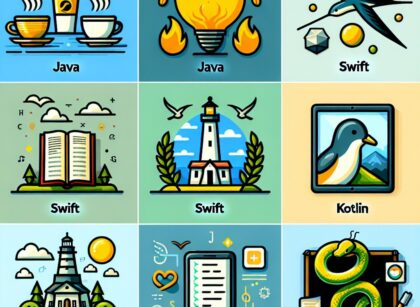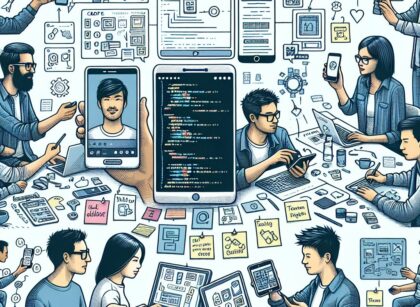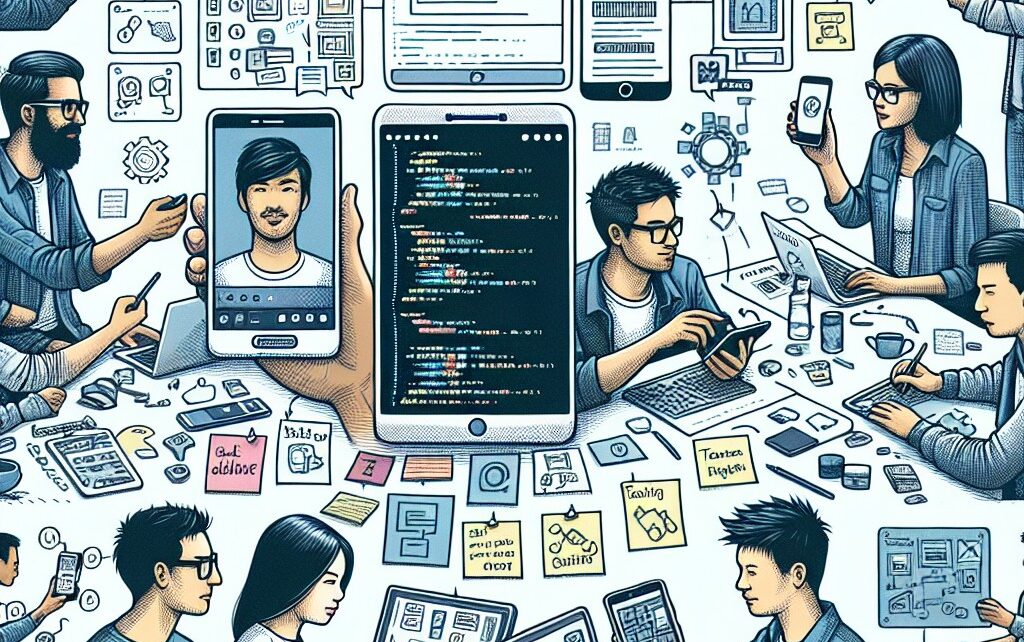- What are the key benefits of mobile apps development for education?
- How does mobile apps development enhance the learning experience for students?
- When should educators consider implementing mobile apps development in their curriculum?
- Why is mobile apps development becoming increasingly important in the education sector?
2. How can mobile apps enhance the learning experience for students?
3. What are some popular mobile apps used in education today?
4. How can educators create their own mobile apps for their classrooms?
5. What are some key features to consider when developing a mobile app for education?
6. How can mobile apps be used to personalize learning for students?
7. What are some challenges in developing and implementing mobile apps for education?
8. How can mobile apps be used to promote collaboration and communication among students and teachers?
9. How can mobile apps be used to track student progress and performance?
10. What are some future trends in mobile app development for education?
What are the key benefits of mobile apps development for education?
- Accessibility: Mobile apps allow students to access educational content anytime, anywhere. This flexibility enables students to learn at their own pace and on their own schedule.
- Engagement: Mobile apps can make learning more interactive and engaging. Features such as quizzes, games, and multimedia content can help students stay focused and motivated.
- Personalization: Mobile apps can be tailored to meet the individual needs and learning styles of students. This personalized approach can help students better understand and retain information.
- Collaboration: Mobile apps can facilitate collaboration among students and teachers. Features such as discussion forums, group projects, and messaging tools can promote communication and teamwork.
- Feedback: Mobile apps can provide instant feedback to students on their progress and performance. This real-time feedback can help students identify areas for improvement and track their learning goals.
- Accessibility: Mobile apps allow students to access educational content anytime, anywhere. This flexibility enables students to learn at their own pace and on their own schedule.
- Engagement: Mobile apps can make learning more interactive and engaging. Features such as quizzes, games, and multimedia content can help students stay focused and motivated.
- Personalization: Mobile apps can be tailored to meet the individual needs and learning styles of students. This personalized approach can help students better understand and retain information.
- Collaboration: Mobile apps can facilitate collaboration among students and teachers. Features such as discussion forums, group projects, and messaging tools can promote communication and teamwork.
- Feedback: Mobile apps can provide instant feedback to students on their progress and performance. This real-time feedback can help students identify areas for improvement and track their learning goals.
Overall, mobile apps development for education offers a wide range of benefits that can enhance the learning experience for students and teachers alike. By leveraging the power of mobile technology, educational institutions can create innovative and engaging learning environments that cater to the needs of today’s digital learners.
How does mobile apps development enhance the learning experience for students?
In today’s digital age, mobile apps have become an integral part of our daily lives. From social media to productivity tools, there seems to be an app for everything. But one area where mobile apps have truly made a significant impact is in education. Mobile apps development has revolutionized the way students learn and interact with educational content. Here are some ways in which mobile apps enhance the learning experience for students:
1. Accessibility: Mobile apps make learning more accessible to students. With just a few taps on their smartphones or tablets, students can access a wealth of educational resources anytime, anywhere. This means that students no longer have to rely on traditional textbooks or classroom lectures to learn new concepts.
2. Engagement: Mobile apps are designed to be interactive and engaging, which helps to keep students motivated and interested in learning. Features such as quizzes, games, and multimedia content make learning fun and enjoyable for students.
3. Personalization: Mobile apps allow for personalized learning experiences. Students can choose their own pace and style of learning, and apps can adapt to their individual needs and preferences. This personalized approach helps students to learn more effectively and retain information better.
4. Collaboration: Mobile apps facilitate collaboration among students and teachers. Features such as discussion forums, group projects, and real-time messaging make it easy for students to work together and share ideas. This collaborative learning environment fosters creativity and critical thinking skills.
5. Feedback: Mobile apps provide instant feedback to students, allowing them to track their progress and identify areas for improvement. This real-time feedback helps students to stay on track and make necessary adjustments to their learning strategies.
6. Accessibility for students with disabilities: Mobile apps can be designed to be accessible to students with disabilities, such as visual or hearing impairments. Features such as screen readers, voice commands, and subtitles make it easier for all students to access educational content.
7. Cost-effective: Mobile apps are a cost-effective solution for schools and educational institutions. Instead of investing in expensive textbooks and learning materials, schools can provide students with access to educational apps at a fraction of the cost.
8. Flexibility: Mobile apps offer flexibility in terms of learning schedules and locations. Students can learn at their own pace and in their own time, whether they are at home, on the go, or in the classroom.
In conclusion, mobile apps development has greatly enhanced the learning experience for students. With their accessibility, engagement, personalization, collaboration, feedback, accessibility for students with disabilities, cost-effectiveness, and flexibility, mobile apps have revolutionized the way students learn and interact with educational content. As technology continues to evolve, the potential for mobile apps to further enhance the learning experience for students is limitless.
When should educators consider implementing mobile apps development in their curriculum?
There are several key factors that educators should consider when deciding whether to implement mobile app development in their curriculum:
- Relevance: In today’s digital age, mobile apps are ubiquitous and play a crucial role in our daily lives. By teaching students how to develop mobile apps, educators can help them gain valuable skills that are highly relevant in today’s job market.
- Engagement: Mobile app development can be a highly engaging and interactive way for students to learn programming and software development skills. By working on real-world projects and seeing their apps come to life, students are more likely to stay motivated and interested in the subject matter.
- Creativity: Mobile app development allows students to unleash their creativity and innovation by designing and building their own apps. This can help them develop critical thinking and problem-solving skills, as well as foster a sense of ownership and pride in their work.
- Employability: In today’s competitive job market, having mobile app development skills can give students a significant advantage when applying for jobs in the tech industry. By incorporating mobile app development into their curriculum, educators can help students build a strong foundation for a successful career in technology.
Overall, educators should consider implementing mobile app development in their curriculum if they want to prepare students for the digital world, engage them in a meaningful and relevant way, foster creativity and innovation, and enhance their employability in the tech industry. By teaching students how to develop mobile apps, educators can help them gain valuable skills that will serve them well in their future careers.
Why is mobile apps development becoming increasingly important in the education sector?
1. Accessibility
One of the main reasons why mobile apps development is important in education is accessibility. With mobile apps, students can access educational resources anytime, anywhere. This flexibility allows students to learn at their own pace and on their own schedule, making education more accessible to a wider range of learners.
2. Personalized learning
Mobile apps can be tailored to meet the individual needs of students. By incorporating features such as adaptive learning algorithms and personalized recommendations, mobile apps can provide a more personalized learning experience for students. This customization can help students learn more effectively and efficiently.
3. Interactive learning
Mobile apps can make learning more engaging and interactive. With features such as quizzes, games, and simulations, students can actively participate in their learning process. This interactivity can help students retain information better and make learning more enjoyable.
4. Collaboration
Mobile apps can facilitate collaboration among students and teachers. Features such as discussion forums, group projects, and real-time messaging can help students work together on assignments and projects. This collaboration can enhance the learning experience and foster a sense of community among students.
5. Real-time feedback
Mobile apps can provide instant feedback to students on their progress. Features such as quizzes and assessments can give students immediate feedback on their performance, allowing them to identify areas for improvement. This real-time feedback can help students track their progress and make adjustments to their learning strategies.
6. Cost-effectiveness
Mobile apps can be a cost-effective solution for educational institutions. By using mobile apps, schools and universities can reduce the costs associated with traditional learning materials such as textbooks and paper. Mobile apps can also help schools reach a wider audience of students, making education more accessible and affordable.
7. Flexibility
Mobile apps offer flexibility in terms of content delivery and learning methods. With mobile apps, educators can easily update and customize educational content to meet the changing needs of students. This flexibility allows educators to adapt to new teaching methods and technologies, keeping education relevant and up-to-date.
8. Remote learning
Mobile apps have become essential for remote learning, especially in light of the COVID-19 pandemic. With mobile apps, students can continue their education from home or any location with an internet connection. This remote learning capability has become crucial for ensuring continuity in education during times of crisis.
Conclusion
Mobile apps development is becoming increasingly important in the education sector due to its accessibility, personalized learning, interactivity, collaboration, real-time feedback, cost-effectiveness, flexibility, and remote learning capabilities. As technology continues to advance, mobile apps will play a vital role in shaping the future of education and providing students with innovative and engaging learning experiences.
- Sure! Here are some questions in English related to the topic The most popular mobile application programming languages: - 15 October 2025
- Sure! Here are some questions related to the hiring process at a software development company: - 6 October 2025
- Sure! Here are some questions related to Mobile Apps Development for Education: - 5 October 2025






